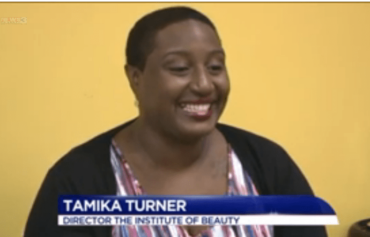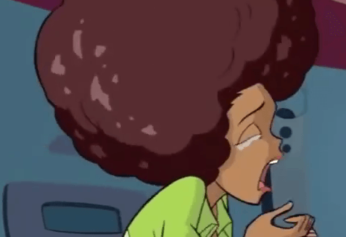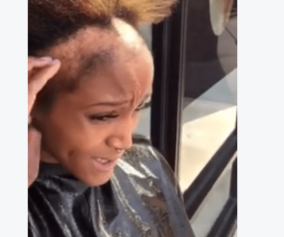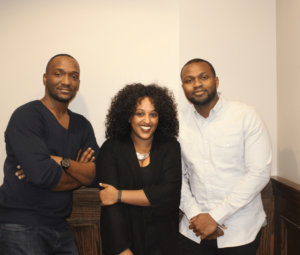
Founders John Eke, Meron Berhe and Richard Kyereboah Jr. Image via Bantuapp.com
As the natural hair movement marches on, the demand for well-trained stylists has become even more vital to Black women everywhere.
According to Mintel research group, sales of hair relaxers have declined steadily from $206 million in 2008 to $152 million in 2013, while effectively increasing sales for natural products and stylists.
Finding the right stylist can be difficult and time consuming. But with the Bantu App, the right hairdresser can be located with pinpoint accuracy in mere minutes.
Now, users can pick stylists based on price, customer feedback/ratings, or particular hairstyle specialty. It also allows the user easy access to hairdressers’ email and phone numbers.
Women can also mark their favorite stylists — once they have found them — and tailor their search accordingly.
As a testament to its ingenuity, the app has garnered international recognition for its accessibility and usefulness.
The Ottawa, Canada-based company was founded in 2015 by 32-year-old Nigerian John Eke, and co-founders 31-year-old Eritrean Meron Berhe and 29-year-old Ghanaian Richard Kyereboah Jr.
Within the course of a few months, the app has an estimated 10,000 users on iPhone and iPad. And there are 2,000 people waiting to use the Android version when it is released.
Furthermore, the team has created a directory of 400 stylists — with 300 of them based across the U.S.
Berhe spoke to Atlanta Black Star about the development of the app and what brought this tremendous trio together.
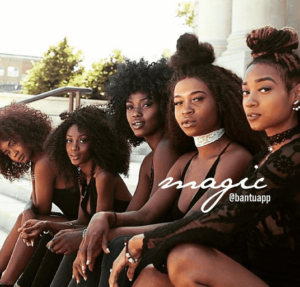
Image via Instagram
What roles do you and your partners play in the development of the app and in the daily operation of the company?
John is the software guru on the team and continues to develop the product behind the scenes. A self-identified nerd, he specialized in computer systems engineering at Carleton University. John has over eight years of professional experience in product design and development.
I’m responsible for the public relations and marketing initiatives of Bantu. Also a graduate of Carleton University, I got a degree in integrated health science, and then psychology, mental health and neuroscience. I have over 10 years of experience working in operations and marketing in real estate, the healthcare industry and with a fitness startup.
Richard takes care of day-to-day operations and keeping the finances in check at Bantu. Richard is a graduate of the University of Toronto. He specialized in economics and geography. He has over four years of experience in the financial service sector.
How did you and your partners meet?
John and I both met in university through mutual friends. We kept in contact over the years since, and when I first learned about his app I was pretty excited. To put it lightly, I nudged him into our first marketing efforts because I knew Bantu was a tool that could benefit Black women everywhere.
Similarly, Richard and John knew each other through a family member. As excited as I was, he also reached out to John. We met, we vibed and then we got working.
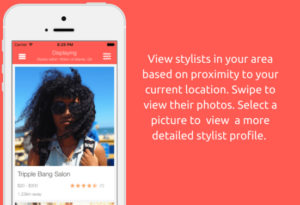
App screenshot
What inspired you to create an app catered to natural hair?
John, the technical founder of Bantu, was an international student studying in Ottawa. He saw other international students relocate to the city and struggle to find anyone in their area to style their hair. After some market research, John decided that technology offered a unique solution and was the perfect way to address the problem of searchability.
Hair stylists are out there, in salons, or working from home, or are traveling hair stylists — but the problem presented that women didn’t have an easy way to access this network of stylists. Word of mouth tended to be the way that most stylists were discovered, which posed a challenge if you didn’t have a network to help you out.
But Bantu is not just meant strictly for natural hair. This is probably one of the most common misconceptions about Bantu. The app is for every Black woman, no matter her hair needs. I think that ladies who are natural do struggle to be catered to the most, so we’re pleased that our app is able to solve this problem.
How does being based in Canada affect your business? Is there a thriving natural hair movement in the country?
We’re of the mindset that your location doesn’t determine your destiny. The majority of Black people in Canada are concentrated in Ottawa, Toronto and Montreal. So statistically, we’re where we want to be.
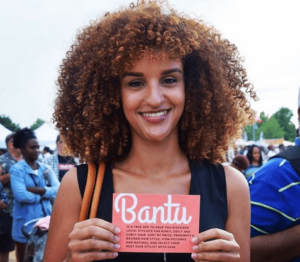
Image via Instagram
Many people we interact with actually do believe we’re located in the U.S. Many Canadians, myself included, will naturally hear of something and automatically think it’s targeted for or developed for the U.S. Often we’ll hear, “Oh, when will this app work in Canada?” and then they will be surprised to hear that it was actually built here.
The app currently works all over Canada, the U.S., France and the U.K. We hope to expand to other countries and worldwide.
In 2016, with technology being what it is, we haven’t really experienced difficulty in communicating or reaching our target market.
Without having lived in the U.S., I can say that the natural hair movement is just as thriving in Canada as it is in the U.S.
I credit a lot of this back to technology. The internet knows no borders.
As a Canadian, I think that it may be harder to actually get natural products here though, without significant shipping costs, but this has dramatically improved over the past few years. It’s an amazing time to be a natural.
Are you part of the natural hair movement? Can you describe your journey with natural hair?
I personally am natural. It’s hard to say exactly how long I’ve been natural. My mom relaxed my hair at the age of 9, and over the years my thick head of hair was tamed into submission.
I didn’t know much about taking care of my hair other than working on straightening it as much as possible. I was obsessed with having it as straight as possible.
Even when I’d go to the salon, the stylists were always focused with taming my hair. I have a very thick head of it.
I learned a lot about taking care of my hair from friends in university, and definitely from hair forums and YouTube videos. At this point it must have been 2006 or 2007, so it was during the early days in the natural movement.
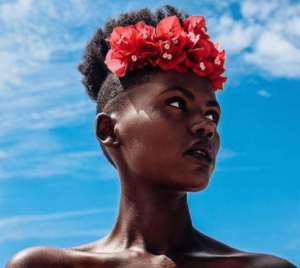
Image via Instagram
I switched my relaxers to texturizers, and increased the length of time between applications, until I finally decided I didn’t want chemicals at all. My plan was to transition — grow out the chemicals — which is a long and gradual process. Dealing with both textures — my natural roots and the chemical ends — was such a nightmare!
My hair in its natural state required so much more care and attention, and I’ve never been interested or talented in terms of styling my hair.
In almost a snap decision one day — about 4 years ago — I decided to do a big chop. My hair was about 1 inch in length all around.
Do you think that the natural hair movement is here to stay?
I absolutely think it is here to stay. It is only gaining momentum. And I think it makes a lot of sense. For myself, and a lot of others, it’s not just about a hair style, or the ability to rock a wash-and-go. It’s given me confidence to step outside into a world where the ideals and norms of beauty don’t look like me, but it doesn’t mean I’m not beautiful in my own right. I love the versatility of my hair.
I love that I have the ability to flat iron it straight but revert back to my curls when I want to. I love that I can get crochet braids when I’m tired of styling it for a bit.
At the same time, we’re seeing the rise of YouTubers and bloggers who make their own products or show us how to use existing products from natural brands. Black women everywhere are encouraging each other through Black Twitter, Instagram, Tumblr, other social media, online forums, blogs, etc.
The Bantu App is available now for free download.
